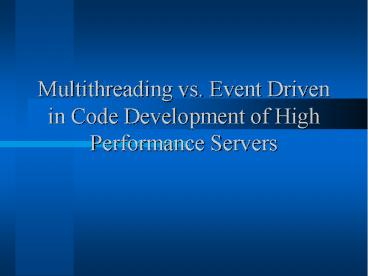Multithreading vs. Event Driven in Code Development of High Performance Servers - PowerPoint PPT Presentation
Title:
Multithreading vs. Event Driven in Code Development of High Performance Servers
Description:
Multithreading vs. Event Driven in Code Development of High Performance Servers Goals Maximize server utilization and decrease its latency. Server process doesn t ... – PowerPoint PPT presentation
Number of Views:182
Avg rating:3.0/5.0
Title: Multithreading vs. Event Driven in Code Development of High Performance Servers
1
Multithreading vs. Event Driven in Code
Development of High Performance Servers
2
Goals
- Maximize server utilization and decrease its
latency. - Server process doesnt block!
- Robust under heavy loads.
- Relatively easy to develop.
3
Key Idea
Multi-threaded servers
Event driven servers
Programming level
Event Driven
Multi-Threaded
Event Driven
Multi-Threaded
Implementation level
4
Key Idea
Multi-threaded servers
Event driven servers
Programming level
Event Driven
Multi-Threaded
Event Driven
Multi-Threaded
Implementation level
- Get the best of the two worlds.
5
Backgound AIO
- Asynchronous I/O mainly used for disk
reads/writes. - Issue disk request and return immediately without
blocking for results. - On completion an event is raised.
6
Servers Architecturesa- Multi-threaded Servers
- Kernel thread per request executing the request
handler. - A thread blocking on I/O doesnt block the
server. - Ex Apache, MySql.
Request Handler
A
B
Function Calls
C
7
Multi-threaded Servers (Cont.)
- Advantages
- Relatively easy to develop.
- Disadvantages
- - Not good performance.
- Thread scheduling.
- Context switching.
- - Doesnt scale.
- Under heavy load , many threads would be created
exhausting kernels memory, crashing the server.
8
Needed for Event-Driven servers
Asynchronous I/O
- Kernel event notification mechanism.
- Supported by FreeBSD Kernel.
- Events queued in a kernel queue, and delivered to
user by kernel calls. - Events usually correspond to AIO completions, or
socket reads/writes.
9
b- Event Driven Servers
- Single thread (event loop).
- AIO operations.
- I/O completions / Requests (events) put in Event
Queue. - Continuations.
- ExFlash web server (slightly different
architecture). - High performance.
- Scalable/Robust.
- - Hard to write.
Event Loop
Events From Kernel
A1
A2
B2
B1
Event Queue (KQueue)
C2
C1
Blocking operation
10
Lazy Threading
- Similar design to event driven but no
continuations. - Threads yield control on fixed points (I/O).
- If request handler doesnt block
- Run handler to completion then use same thread to
handle next event. - Else
- Suspend current thread, create another user
thread to handle next event.
11
Wrappers / Thread Suspension
- IO_Wrapper(..)
- uc save_user_context(..)
- / save the current user thread context to be
able to resume it later / - aio_func(..)
- / non-blocking I/O call /
- stackallocate_stack()
- switch_thread(event_loop,stack)
- / suspend current thread and create a new thread
running the event loop using the newly allocated
stack / - .
- .
- Wrappers around blocking operations to create
the blocking illusion. - Uses AIO.
- Saves current stack instead of unwinding it.
- Creates a user thread by jumping to the event
loop and using a new stack.
12
Thread Resumption
- Event_loop()
- .
- .
- .
- e get_event(..)
- / read new event from the kernels kqueue /
- if e is completion of aio_func(..)
- run_thread(uc)
- / dispose current thread and resume the
IO_Wrapper from where it has stopped / - .
- .
- Restores registers and jumps back to wrapper as
if blocking has finished. - Current thread is disposed as its useless.
- Wrappers thread eventually returns to the event
loop after handling its request.
13
Summary
Lazy-Threaded
Event Driven
Multi-Threaded
Yes
Yes
No
Scalable
Yes
Yes
No
High Performance
Yes
No
Yes
Easy to build
Yes(user)
No
Yes(kernel)
gt1 thread
No
No
Yes
Thread / request?
No
N/A
Yes
Arbitrary thread yield































